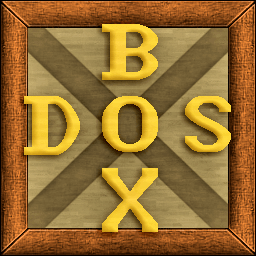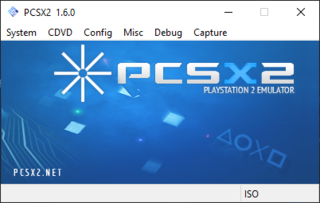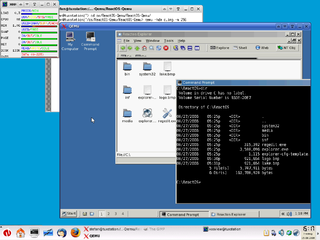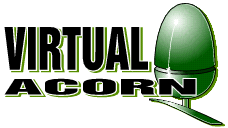 W
WBasilisk II is an emulator which emulates Apple Macintosh computers based on the Motorola 68000 series. The software is cross-platform and can be used on a variety of operating systems.
 W
WBochs is a portable IA-32 and x86-64 IBM PC compatible emulator and debugger mostly written in C++ and distributed as free software under the GNU Lesser General Public License. It supports emulation of the processor(s), memory, disks, display, Ethernet, BIOS and common hardware peripherals of PCs.
 W
WDolphin is a free and open-source video game console emulator for GameCube and Wii that runs on Windows, Linux, macOS, and Android.
 W
WDOSBox is a free and open-source emulator of an Intel x86 personal computer designed primarily for the purpose of running software created for disk operating systems on IBM PC compatibles. It was first released in 2002, during which time DOS technology was becoming obsolete. It is notable for its widespread use for running DOS video games, as well as being used in commercial rereleases of those games.
 W
WFCEUX is an open-source Nintendo Entertainment System and Family Computer Disk System emulator. It is a merger of various forks of FCE Ultra.
 W
WHercules is a computer emulator allowing software written for IBM mainframe computers and for plug compatible mainframes to run on other types of computer hardware, notably on low-cost personal computers. Development started in 1999 by Roger Bowler, a mainframe systems programmer.
 W
Whigan is a free emulator for multiple video game consoles, including the Super Nintendo Entertainment System. Originally called bsnes, the emulator is notable for attempting to emulate the original hardware as accurately as possible through low-level, cycle-accurate emulation and for the associated historical preservation efforts of the SNES platform.
 W
WMAME is a free and open-source emulator designed to recreate the hardware of arcade game systems in software on modern personal computers and other platforms. Its intention is to preserve gaming history by preventing vintage games from being lost or forgotten. It does this by emulating the inner workings of the emulated arcade machines; the ability to actually play the games is considered "a nice side effect". Joystiq has listed MAME as an application that every Windows and Mac gamer should have.
 W
WMednafen, formerly known as Nintencer, is an OpenGL and SDL multi-system free software wrapper that bundles various original and third-party emulation cores into a single package, and is driven by command-line input. It is distributed under the terms of the GNU GPLv2. Certain emulation cores of Mednafen have been ported to RetroArch/Libretro.
 W
WPCSX2 is a free and open-source PlayStation 2 emulator for Windows, Linux, and macOS that supports a wide range of PlayStation 2 video games with a high level of compatibility and functionality. Although PCSX2 can closely mirror the original gameplay experience on the PlayStation 2, PCSX2 supports a number of improvements over gameplay on a traditional PlayStation 2, such as the ability to use custom resolutions up to 8192×8192, anti-aliasing, and texture filtering.
 W
WPlayOnMac is a free compatibility layer for macOS that allows installation and use of video games and apps designed to run on Microsoft Windows. PlayOnMac is based on the open-source Wine project.
 W
WPPSSPP is a free and open-source PSP emulator for Windows, macOS, Linux, iOS, Android, Nintendo Switch, BlackBerry 10, and Symbian with an increased focus on speed and portability. It was first released to the public on November 1, 2012, licensed under the GNU GPLv2 or later. The PPSSPP project was created by Henrik Rydgård, one of the co-founders of the Dolphin emulator.
 W
WQEMU is a free and open-source emulator and virtualizer that can perform hardware virtualization.
 W
WRosetta is a dynamic binary translator developed by Apple Inc. for macOS, an application compatibility layer between different instruction set architectures. It gives developers and consumers a transition period in which to update their application software to run on newer hardware, by "translating" it to run on the different architecture. The name "Rosetta" is a reference to the Rosetta Stone, the artifact which enabled translation of Egyptian hieroglyphs.
 W
WSheepShaver is an open-source PowerPC Apple Macintosh emulator originally designed for BeOS and Linux. The name is a play on ShapeShifter, a Macintosh II emulator for AmigaOS, which is in turn not to be confused with a third-party preference pane for Mac OS X with the same name. The ShapeShifter and SheepShaver projects were originally conceived and programmed by Christian Bauer. However, currently, the main developer behind SheepShaver is Gwenolé Beauchesne.
 W
WSnes9x is an SNES emulator written in C++ with official ports for DOS, Linux, Microsoft Windows, AmigaOS 4, macOS, MorphOS, Xbox, PSP, PS3, Nintendo GameCube, Nintendo Wii, iOS, and Android. Both Windows RT and Windows Phone 8 have an unofficial port named Snes8x.
 W
WStella is an emulator of the Atari 2600 game console, and takes its name from the console's codename. It is open-source, and runs on most major modern platforms including Windows, Mac OS X, and Linux. Stella was originally written in 1996 by Bradford W. Mott, and is now maintained by Stephen Anthony.
 W
WUAE is a computer emulator which emulates the hardware of Commodore International's Amiga range of computers. Released under the GNU General Public License, UAE is free software.
 W
WThe software program VICE, standing for VersatIle Commodore Emulator, is a free and cross platform emulator for Commodore's 8-bit computers. It runs on Linux, Amiga, Unix, MS-DOS, Win32, Mac OS X, OS/2, RISC OS, QNX, GP2X, Pandora (console), Dingoo A320, Syllable, and BeOS host machines. VICE is free software, released under the GNU General Public Licence.
 W
WVirtualAcorn is the brand name of several commercial emulators of Acorn Computers computer hardware platforms.
 W
WWindows Virtual PC is a virtualization program for Microsoft Windows. In July 2006 Microsoft released the Windows version as a free product. In August 2006, Microsoft announced the Macintosh version would not be ported to Intel-based Macintosh computers, effectively discontinuing the product as PowerPC-based Macintosh computers would no longer be manufactured. The newest release, Windows Virtual PC, does not run on versions of Windows earlier than Windows 7, and does not officially support MS-DOS or operating systems earlier than Windows XP Professional SP3 as guests. The older versions, which support a wider range of host and guest operating systems, remain available. Starting with Windows 8, Hyper-V supersedes Windows Virtual PC.